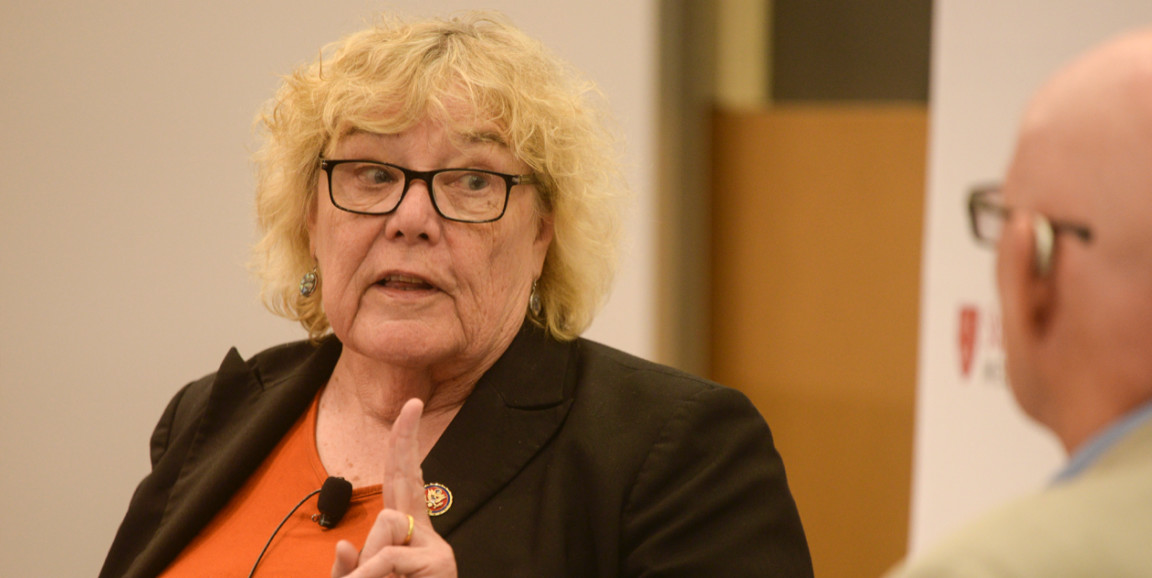After almost 25 years representing her Bay Area district, Congresswoman Zoe Lofgren (D-Calif.) is still driven by the same purpose she had at the start of her career: to make the United States a better home for future generations.
Her mission, Lofgren said in a Stanford Health Policy Forum on the future of health care policy in the U.S., is to ensure that young "people who don't have hope can have hope... and realistically can achieve their dreams, live an adequate economic lifestyle and have a rich emotional life."
During the conversation, introduced by Dean Lloyd Minor, MD, and addiction specialist Keith Humphreys, PhD; and facilitated by Paul Costello, senior communications strategist for Stanford Medicine, Lofgren spoke candidly about the most vexing issues in U.S. policy.

As chair of the Subcommittee on Immigration and Citizenship, Lofgren said her focus is on building bipartisan support for improving the nation's immigration system.
But she and her colleagues are also grappling with other crucial issues, and health care access and affordability are chief among them.
While legal challenges to the Affordable Care Act wind through federal courts, the conversation about health care, including among 2020 Democratic presidential candidates, has turned to other ideas -- including Medicare-for-all.
During the forum, Lofgren responded to recent reports that, despite deep divisions in Congress about the ACA, there's evidence that it has resulted in Americans being more healthy and less likely to die. Other reports, though, show that annual family premiums for employer-sponsored care rose 5% for an average of about $20,500 this year.
Lofgren said changes to the ACA, before and since it was passed, have resulted in higher premiums than many working families can afford, but the system is still better than before the law was enacted.
"It's less than perfect in many ways, and we didn't do as much as we might have in terms of aggressively dealing with unjustifiable increases in pharmaceutical costs," she said. "And we failed to do adequate adjustments for the differences in cost of living between various metropolitan statistical areas."
Asked how the issue might eventually play out, Lofgren said if the courts reject the validity of the ACA, there will be a "mad scramble" to find a replacement.
"The basic thing to think about is what the people in the country are saying to you," she said. "And mostly, they're saying, 'Pharmaceuticals are too expensive, health care's too expensive. I want to make sure that if I'm sick or my family's sick, I can get the care that we need.' That's what ought to be guiding our efforts and all of these of arguments."
Meanwhile, she said she doesn't believe any of the health care bills under consideration can pass as they're written, so she has co-sponsored them all to keep the conversation going.
This stuff is as big as 20% of the U.S. economy... You don't just flip a switch and change it. So there's going to be substantial discussion, and as we move forward we need to make sure that the ACA is maintained and strengthened.
Lofgren also talked about other pressing health issues, including vaping deaths, gun violence and the opioid addiction crisis.
"There are people who are being injured and, in some cases, dying after vaping," she said. "If we had that another product where you had hundreds of people hospitalized after using it, there'd be a recall" or inquiry into what happened.

Reflecting on recent court cases against Johnson & Johnson and Purdue Pharma, who have been widely blamed for fueling the nation's opioid crisis, Lofren said it's incumbent upon Congress to see the crisis for what it is, and not necessarily a criminal justice problem.
"We need to start dealing with this health issue as a health issue, as a treatment issue, and as a prevention issue," she said. "The federal government isn't quite there yet and a lot of localities aren't."
Going after drug dealers is important, she said, but not enough.
"The parents of those who've lost their sons and daughters want an answer and they don't think the answer is a law enforcement answer," she said. "They don't think that stigmatizing their sons and daughters is really going to solve the problem. They want treatment and they want prevention and they want a solution."
Photos by Rod Searcey




